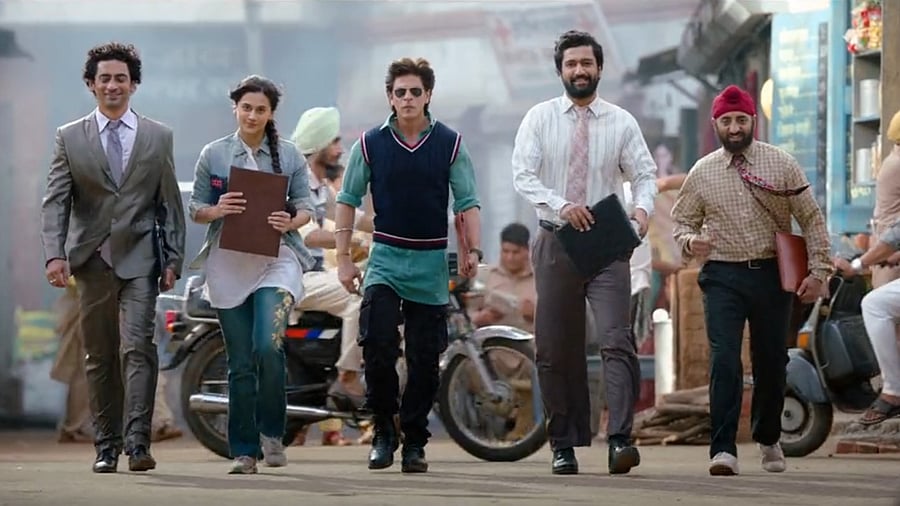
'Dunki' Drop 1.
Credit: Special Arrangement
After a 4-year hiatus, Shah Rukh Khan has reinvented himself. He made a grand return with two actioners (‘Pathaan’ and ‘Jawan’) and a comedy drama (Dunki). While the three films explore distinct themes, they have a growing similarity in their souls. All of them feature Shah Rukh Khan playing a soldier in his own trademark style that leaves an indelible impression.
The last time this happened was in 2004, with two important films from his career — Veer-Zaara and Main Hoon Na. Both were political and dealt with relations between India and Pakistan. Khan’s characters — Veer and Major Ram — were both deeply sensitive beings for whom loving one’s country didn’t mean turning bitter towards another. His hyper-romantic persona combines with the edginess required of a character in the army. What this results in is a vulnerable and deeply lovable man in uniform.
In Dunki, which is similar to Veer-Zaara, he does the same. Though he has lived at the border at some point in his life and faced the ‘enemy’, he is not consumed by hate. In a poignant scene in the courtroom, Shah Rukh Khan’s Hardy advocates for a world without borders. As an army person, he hopes for a world where his occupation would become irrelevant. He is positioned as someone who is guided by love and empathy, not as someone who possesses abundant physical strength. This is clear from the way his character is introduced in the film — as someone who returns to meet the friend who saved his life when he was shot during a conflict.
In Pathaan, his character draws a clear line between jingoism and patriotism. While he represents a certain kind of nationalism that sees wars as a necessity, it is never about spreading hatred. At the same time, his character in Jawan is a dissenter who is urging others to ask necessary questions of the government. After watching these films, it is difficult not to fall in love with Khan and what he represents. Even though they are Utopian, the ideas reflected in these films are something to strive for. If ‘Pathaan’ gave a glimpse of how relations between countries should be, ‘Jawan’ was about relations within the country — between citizens and the state.
While in real life he has maintained an apolitical stance, through his films he chooses to say what he wants to.
Shah Rukh Khan has made sure to appeal to popular sentiment, where the army man automatically grabs everyone’s respect. He builds on egalitarian ideas and subverts the army man of Hindi cinema from the chest- beating, bloodthirsty kind to the one who wins everyone over with his dimples. When he spreads his arms wide, it is as if they can contain the pain suffered by a nation (as in Pathaan), by a community (as in ‘Jawan’), or by individuals (as in Dunki). If looked at closely, Shah Rukh Khan’s army man evokes the principles of love and justice.
Pathaan and Jawan’are action flicks that have a political message, albeit faint and somewhat simplistic. One does wish many things from influential people like him, but he makes up for the silence outside by making his voice stronger on screen.